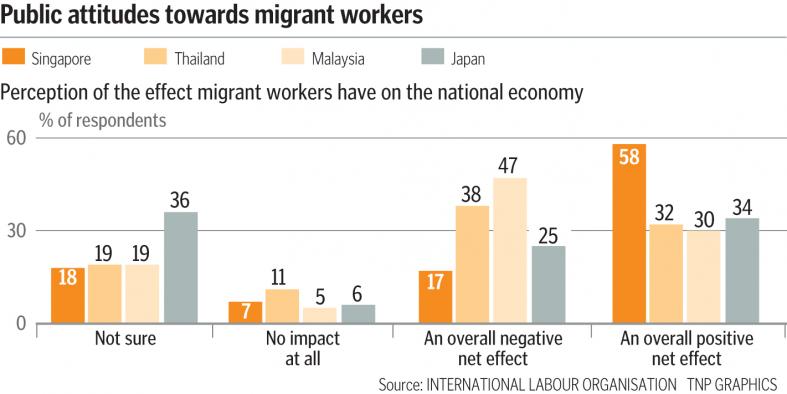Singaporeans hold positive attitudes towards migrant workers: Survey
Singaporeans have a more positive view of migrant workers than some of their Asian counterparts, according to a new survey report.
About 58 per cent of Singaporean respondents see migrant workers as having an overall positive net effect on the economy, which is a greater proportion than respondents in Malaysia (30 per cent), Thailand (32 per cent) and Japan (34 per cent).
Still, 30 per cent of respondents here see migrant workers as a "drain on the national economy", though this is lower than the 47 per cent in Malaysia, 40 per cent in Thailand and 32 per cent in Japan who agreed with the statement.
Overall, positive attitudes towards migrant workers have declined over the last decade even as migration has increased, said the International Labour Organisation and United Nations Women in a report released yesterday, which was International Migrants Day.
The report, Public Attitudes Towards Migrant Workers In Japan, Malaysia, Singapore, And Thailand, was based on a survey of 4,099 nationals of the four countries, including 1,005 Singaporeans.
It also included interviews done with governments, employers' bodies and non-governmental organisations, among others.
The survey was conducted between last December and January this year.
The majority of Singaporean respondents agreed that there is a labour shortage here.
When asked if Singapore has a need for more workers, 59 per cent of respondents here said yes but mainly for low skilled workers doing routine manual work, while 14 per cent said they are needed mainly for high skilled jobs like doctors and lawyers.
There were 1.4 million foreigners working here as of June, according to Ministry of Manpower data.
These include 255,800 domestic helpers, 284,300 construction workers on work permits and 189,000 Employment Pass holders.

The report also said that 32 per cent of respondents here felt migrant workers have poor ethics and cannot be trusted, the lowest share out of the four countries surveyed.
NO TO SAME PAY BENEFITS
But 60 per cent felt that migrant workers should not receive the same pay benefits as local workers, the highest share out of the four countries.
The report noted that popular beliefs in the region include migrant workers receiving more workplace benefits than they actually do, and such workers taking away jobs from citizens.
But it also said that the Singapore public seems better informed about socio-economic migration trends and realities than people in the other countries.
They are also more likely to have closer relationships with foreigners, such as having friends, colleagues, subordinates or employees who are migrant workers.
However, overall support for migrant workers here has gone down.
Comparing a separate indicator score measuring knowledge, attitudes and practices towards migrant workers against that of a 2010 survey showed that Singapore's score had dropped seven points to 29, from 36.
However, this was still higher than Malaysia (13) and Thailand (12). Japan was not surveyed in 2010.
FOR MORE, READ THE STRAITS TIMES
Get The New Paper on your phone with the free TNP app. Download from the Apple App Store or Google Play Store now

